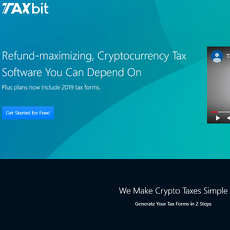Best Crypto Tax Software (2026) – Accounting Imports, Cost Basis & Reports
Few things are as important as taxes to crypto practitioners. This assertion holds as governments continue to enact crypto tax laws and prosecute individuals found wanting. In light of this, one must go all out to ensure that crypto activities and transactions are correctly logged to reconcile profits and losses, as directed by the crypto tax laws governing your location.
As straightforward as this seems, it entails rigorous scrutiny and error-free calculations that could come as daunting tasks, especially if you actively engage with the crypto market and require a day trading cryptocurrency accounting software. Hence, the need for specially designed software that pools transaction data from various crypto platforms and prepare tax returns based on the logged data and the framework accepted in your jurisdiction. These tools are cryptocurrency accounting software. And since they are must-haves for crypto participants, we have decided to explore their workings, review some of the platforms rendering these services, and introduce you to the top-performing ones.
A crypto tax software imports a user’s transaction history from exchanges and other crypto payment or retail platforms and calculates the tax that he or she ought to pay the government. That said, these software products have become essential tools for every crypto participant, even as authorities begin to see the financial benefits of expanding their existing tax regulatory frameworks to the crypto space or formulating new ones tailored to the digital asset market.
Although it is possible to prepare tax returns with commonly used software, however, more often than not, generic blockchain accounting software for traders cannot import data directly from crypto exchanges and wallets. Herein lies the real value that crypto accounting software products bring to the table. Another reason why crypto practitioners need to adopt these platforms is that crypto exchanges rarely issue consolidated forms that contain the losses/gains generated from cryptocurrency trades, cost basis, and annual proceedings. Therefore, it is advisable to enlist the help of specialized cryptocurrency accounting software that can circumvent this limitation and provide the appropriate cryptocurrency bookkeeping.
There are two basic classes of crypto tax software. The first is traditional tax calculation software products that have gone ahead to add crypto tax return preparation as one of their core services. In essence, these platforms have made some tweaks to their operations by implementing data importation technologies compatible with one or more crypto wallets or exchanges.
On the other hand, we have crypto tax software that majorly avails services to crypto practitioners. Thus, a majority of products that fall under this category boast superior compatibility capabilities, and they go beyond crypto exchanges to even support gambling sites, crypto wallets, and crypto eCommerce platforms.
Utilizing a crypto accounting program is not a free endeavor, as these platforms often provide different tiers of services with their respective prices. In most cases, the volume of transactions reviewed has a significant bearing on the service plan you will fall under and the fees you will pay the platform to help you prepare your tax returns.
Crypto tax software usually provides Application Programming Interfaces APIs, which facilitates seamless, instant, and accurate data synchronization and importation functions. While this is a given, crypto tax software products also implement the Comma Separated Values CSV import. This integration application entails that users download the history of their transactions on exchanges in the CSV format and manually upload them into the cryptocurrency tax calculation software.
The API integration system is the best way to upload data on crypto software products. Although it may look technical at first, adopting the API import is, however, easy. All you need do is copy the API key available on your crypto wallet or exchange and paste it on the appropriate section in the crypto tax software website. Once you paste the keys, the software automatically retrieves transaction data and reconciles the profits and losses.
Whereas, for the CSV import, you have to ensure that the data is in the right format and that there are no errors. As such, the CSV integration method may require that you sort and edit transaction data before uploading them to your crypto tax software. Needless to say, adopting the API import is a more accurate and simpler integration process than the error-prone and long CSV import.
The answer to this frequently asked question is not straightforward. Note that cryptocurrency accounting software providers do not reveal the maximum number of data they can process at once. Nonetheless, the infrastructures, protocols, and bandwidths of these platforms certainly have their maximum performance threshold. And whenever the platform processes the volume of transactions that stretches its capabilities, it is bound to experience glitches and low loading speed. In other words, crypto tax software products unofficially have the maximum number of transactions they can process.
Although crypto tax software platforms are great tools for crypto practitioners, it is, nonetheless, important to understand that there are reasons why you should still get your cryptocurrency accountant and cryptocurrency tax advisor involved in the process. Involving experts will validate your operations on the crypto tax software product. By so doing, you can determine whether the crypto tax report format aligns with the tax regulations governing your jurisdiction. Also, it is good to have your cryptocurrency accountant analyze the output of your crypto tax software to ensure that you are not overpaying or underpaying tax.
Having answered some of the frequently asked questions relating to cryptocurrency accounting software, the next section will introduce you to integral factors that could help you pick the crypto tax software platform that best suits you.
Understand that a majority of crypto tax software platforms streamline their services to specific jurisdictions. On the other hand, some claim to provide tax report services that encapsulate a broader array of markets. In light of this, it is imperative to verify that the crypto tax software product you are considering supports the tax report format that regulators require you to fill and submit. You can do this with the help of a cryptocurrency accountant or tax advisor. If you are not too savvy with tax-related technicalities, an expert can explain the tax class that governs crypto activities in your location and identify a crypto tax software product that can help you fulfill your obligations.
Just as it is important to check the compatibility of a crypto tax software with the tax regulatory requirements of your jurisdiction, you should also ensure that its track record suggests that it is a reliable product. Here, you could check the number of established firms that either endorse or use it to improve their tax operations. Likewise, ascertain that all of the features function as advertised. If you pay for a premium tax calculation package, then the platform must be responsible enough to provide you premium services.
Earlier in the guide, we mentioned that there are two basic integration systems commonly implemented on cryptocurrency accounting software platforms. Also, we defined both systems and explained their pros and cons. As such, we advise that you capitalize on this information whenever you are researching a crypto tax software product. For one, take the time to determine the number of exchanges and wallets the platform’s API integration system supports. The more the number of platforms the software can effortlessly fetch data from, the better. It is unadvisable to lean too much on the CSV integration system, which might expose your tax returns to errors that may later come back to burn you.
Bandwidth is an important factor that people planning on importing or processing a large volume of transactions should consider. The processing capability of the platform would determine whether the software can work on all your data at once. That said, a majority of cryptocurrency accounting software platforms are not keen on making information relating to their bandwidths and processing capabilities readily available to clients. However, we advise that you request this information from representatives of the platform before opting for any of their service plans.
In most cases, cryptocurrency accounting software platforms incorporate a tiered-based service plan system that checks the volume of transactions imported and bumps users up or down the tiers according to their workload. As such, you should verify the fees for each service plan, compare it with other platforms’ fees structure, and decide if it is right for you.
Since the product is targeting problems relating to tax, you should, therefore, ensure that the team backing the platform has a background in the tax regulatory or compliance space. To do this, you could research team members and verify that at least one of them has experience in the tax regulation field. Also, you can judge the team’s expertise in the subject matter by perusing their blogs to gauge how familiar they are with tax regulations in the jurisdictions they claim to cater to. Besides, you can review the team’s relationship with tax regulators. Likewise, you can examine the media presence of the team and determine how often the members contribute to trending issues in the tax regulation space.
Cryptocurrency accounting software platforms must implement simple and intuitive designs that improve user experience. With the appropriate design in place, it becomes easier for users to understand and navigate the features on the site. This requirement is crucial for the API integration section of the website, as it would determine how effortless users go about importing foreign data.
Like every other service website, cryptocurrency accounting software platforms ought to incorporate premium customer support for their customers. Note that it is the propensity of your tax software website to avail quality feedback mechanism that will determine if you are going to get answers to questions relating to the bandwidth and processor capacity of both the website and the software. Also, it becomes easier to access information about the prices of service packages and ensure that you are not being shortchanged.
Blockchain accounting software platforms have continued to evolve by introducing more features that would help them quicken tax reporting processes or improve their outputs. For one, some platforms offer crypto portfolio tracking tools, which monitor crypto holdings in real-time. Similarly, you could access a file-sharing tool that bodes well for users who would love to ask their cryptocurrency accountant to scrutinize their accounts without having to give out their login details. Regardless of the array of features available on the crypto accounting software website, ensure that they are of use to you.
Crypto taxation is a trending topic in the crypto space, and it will continue to garner attention, even as we expect more regulatory frameworks containing the tax obligations of crypto participants. In light of this, we at Cryptolinks have opted to contribute to the conversation by presenting you with an extensive review of the accounting for cryptocurrency market and the top cryptocurrency accounting software platforms operating within this sector.
While reviewing these crypto accounting websites, we verified the number of jurisdictions they support and their expertise in tax regulations governing these locations. Also, we assessed the bandwidth and processing capacity of the platform. Thereafter, we checked for credibility and their penchant for collaborating with tax regulators and contributing to tax-related topics.
After scrutinizing these websites’ legitimacy and credibility, we examined the pricing system of each to determine how reasonable they are. Next, we gauged the user interfaces of the websites and how they positively or negatively affect user experience. Furthermore, we researched the number of crypto exchanges and wallets that each blockchain accounting software platform supported and reviewed each’s data importation system. Lastly, we took a look at the added features found on these sites and their impacts on users’ day-to-day activities.
At the end of these tasking research processes, we checked only the best cryptocurrency accounting software platforms that deserve a mention on our list of best crypto accounting software. Note that there is a separate review for each website, and we expect that you would explore them before deciding on the one that suits you.
As straightforward as this seems, it entails rigorous scrutiny and error-free calculations that could come as daunting tasks, especially if you actively engage with the crypto market and require a day trading cryptocurrency accounting software. Hence, the need for specially designed software that pools transaction data from various crypto platforms and prepare tax returns based on the logged data and the framework accepted in your jurisdiction. These tools are cryptocurrency accounting software. And since they are must-haves for crypto participants, we have decided to explore their workings, review some of the platforms rendering these services, and introduce you to the top-performing ones.
What Is Crypto Accounting Software?
A crypto tax software imports a user’s transaction history from exchanges and other crypto payment or retail platforms and calculates the tax that he or she ought to pay the government. That said, these software products have become essential tools for every crypto participant, even as authorities begin to see the financial benefits of expanding their existing tax regulatory frameworks to the crypto space or formulating new ones tailored to the digital asset market.
Although it is possible to prepare tax returns with commonly used software, however, more often than not, generic blockchain accounting software for traders cannot import data directly from crypto exchanges and wallets. Herein lies the real value that crypto accounting software products bring to the table. Another reason why crypto practitioners need to adopt these platforms is that crypto exchanges rarely issue consolidated forms that contain the losses/gains generated from cryptocurrency trades, cost basis, and annual proceedings. Therefore, it is advisable to enlist the help of specialized cryptocurrency accounting software that can circumvent this limitation and provide the appropriate cryptocurrency bookkeeping.
What Are the Different Variations of Crypto Tax Software Products?
There are two basic classes of crypto tax software. The first is traditional tax calculation software products that have gone ahead to add crypto tax return preparation as one of their core services. In essence, these platforms have made some tweaks to their operations by implementing data importation technologies compatible with one or more crypto wallets or exchanges.
On the other hand, we have crypto tax software that majorly avails services to crypto practitioners. Thus, a majority of products that fall under this category boast superior compatibility capabilities, and they go beyond crypto exchanges to even support gambling sites, crypto wallets, and crypto eCommerce platforms.
Are The Services of Crypto Tax Software Products Free?
Utilizing a crypto accounting program is not a free endeavor, as these platforms often provide different tiers of services with their respective prices. In most cases, the volume of transactions reviewed has a significant bearing on the service plan you will fall under and the fees you will pay the platform to help you prepare your tax returns.
What Are the Various Means of Importing Data That Crypto Tax Software Products Support?
Crypto tax software usually provides Application Programming Interfaces APIs, which facilitates seamless, instant, and accurate data synchronization and importation functions. While this is a given, crypto tax software products also implement the Comma Separated Values CSV import. This integration application entails that users download the history of their transactions on exchanges in the CSV format and manually upload them into the cryptocurrency tax calculation software.
The API integration system is the best way to upload data on crypto software products. Although it may look technical at first, adopting the API import is, however, easy. All you need do is copy the API key available on your crypto wallet or exchange and paste it on the appropriate section in the crypto tax software website. Once you paste the keys, the software automatically retrieves transaction data and reconciles the profits and losses.
Whereas, for the CSV import, you have to ensure that the data is in the right format and that there are no errors. As such, the CSV integration method may require that you sort and edit transaction data before uploading them to your crypto tax software. Needless to say, adopting the API import is a more accurate and simpler integration process than the error-prone and long CSV import.
Do Crypto Tax Software Products Have Limits as Regards the Number of Transaction Data They Can Process?
The answer to this frequently asked question is not straightforward. Note that cryptocurrency accounting software providers do not reveal the maximum number of data they can process at once. Nonetheless, the infrastructures, protocols, and bandwidths of these platforms certainly have their maximum performance threshold. And whenever the platform processes the volume of transactions that stretches its capabilities, it is bound to experience glitches and low loading speed. In other words, crypto tax software products unofficially have the maximum number of transactions they can process.
Are Crypto Tax Software Products Good Alternatives to Cryptocurrency Tax Professionals and Cryptocurrency Accountants?
Although crypto tax software platforms are great tools for crypto practitioners, it is, nonetheless, important to understand that there are reasons why you should still get your cryptocurrency accountant and cryptocurrency tax advisor involved in the process. Involving experts will validate your operations on the crypto tax software product. By so doing, you can determine whether the crypto tax report format aligns with the tax regulations governing your jurisdiction. Also, it is good to have your cryptocurrency accountant analyze the output of your crypto tax software to ensure that you are not overpaying or underpaying tax.
What Are the Factors to Consider When Looking to Choose A Reliable Cryptocurrency Accounting Software?
Having answered some of the frequently asked questions relating to cryptocurrency accounting software, the next section will introduce you to integral factors that could help you pick the crypto tax software platform that best suits you.
The Jurisdiction That the Cryptocurrency Accounting Software Supports
Understand that a majority of crypto tax software platforms streamline their services to specific jurisdictions. On the other hand, some claim to provide tax report services that encapsulate a broader array of markets. In light of this, it is imperative to verify that the crypto tax software product you are considering supports the tax report format that regulators require you to fill and submit. You can do this with the help of a cryptocurrency accountant or tax advisor. If you are not too savvy with tax-related technicalities, an expert can explain the tax class that governs crypto activities in your location and identify a crypto tax software product that can help you fulfill your obligations.
The Credibility of The Cryptocurrency Accounting Software
Just as it is important to check the compatibility of a crypto tax software with the tax regulatory requirements of your jurisdiction, you should also ensure that its track record suggests that it is a reliable product. Here, you could check the number of established firms that either endorse or use it to improve their tax operations. Likewise, ascertain that all of the features function as advertised. If you pay for a premium tax calculation package, then the platform must be responsible enough to provide you premium services.
The Integration Capability of The Software for Accounting for Cryptocurrency
Earlier in the guide, we mentioned that there are two basic integration systems commonly implemented on cryptocurrency accounting software platforms. Also, we defined both systems and explained their pros and cons. As such, we advise that you capitalize on this information whenever you are researching a crypto tax software product. For one, take the time to determine the number of exchanges and wallets the platform’s API integration system supports. The more the number of platforms the software can effortlessly fetch data from, the better. It is unadvisable to lean too much on the CSV integration system, which might expose your tax returns to errors that may later come back to burn you.
The Bandwidth and Processing Capability of The Cryptocurrency Accounting Software Platform
Bandwidth is an important factor that people planning on importing or processing a large volume of transactions should consider. The processing capability of the platform would determine whether the software can work on all your data at once. That said, a majority of cryptocurrency accounting software platforms are not keen on making information relating to their bandwidths and processing capabilities readily available to clients. However, we advise that you request this information from representatives of the platform before opting for any of their service plans.
The Fees Imposed on Users
In most cases, cryptocurrency accounting software platforms incorporate a tiered-based service plan system that checks the volume of transactions imported and bumps users up or down the tiers according to their workload. As such, you should verify the fees for each service plan, compare it with other platforms’ fees structure, and decide if it is right for you.
The Background of The Team
Since the product is targeting problems relating to tax, you should, therefore, ensure that the team backing the platform has a background in the tax regulatory or compliance space. To do this, you could research team members and verify that at least one of them has experience in the tax regulation field. Also, you can judge the team’s expertise in the subject matter by perusing their blogs to gauge how familiar they are with tax regulations in the jurisdictions they claim to cater to. Besides, you can review the team’s relationship with tax regulators. Likewise, you can examine the media presence of the team and determine how often the members contribute to trending issues in the tax regulation space.
The Interface of The Platform and How It Impacts User Experience
Cryptocurrency accounting software platforms must implement simple and intuitive designs that improve user experience. With the appropriate design in place, it becomes easier for users to understand and navigate the features on the site. This requirement is crucial for the API integration section of the website, as it would determine how effortless users go about importing foreign data.
The Customer Support of The Cryptocurrency Accounting Software Platform
Like every other service website, cryptocurrency accounting software platforms ought to incorporate premium customer support for their customers. Note that it is the propensity of your tax software website to avail quality feedback mechanism that will determine if you are going to get answers to questions relating to the bandwidth and processor capacity of both the website and the software. Also, it becomes easier to access information about the prices of service packages and ensure that you are not being shortchanged.
Other Features or Perks Available on The Platform
Blockchain accounting software platforms have continued to evolve by introducing more features that would help them quicken tax reporting processes or improve their outputs. For one, some platforms offer crypto portfolio tracking tools, which monitor crypto holdings in real-time. Similarly, you could access a file-sharing tool that bodes well for users who would love to ask their cryptocurrency accountant to scrutinize their accounts without having to give out their login details. Regardless of the array of features available on the crypto accounting software website, ensure that they are of use to you.
How Did Cryptolinks Compile Its List of The Best Cryptocurrency Accounting Software?
Crypto taxation is a trending topic in the crypto space, and it will continue to garner attention, even as we expect more regulatory frameworks containing the tax obligations of crypto participants. In light of this, we at Cryptolinks have opted to contribute to the conversation by presenting you with an extensive review of the accounting for cryptocurrency market and the top cryptocurrency accounting software platforms operating within this sector.
While reviewing these crypto accounting websites, we verified the number of jurisdictions they support and their expertise in tax regulations governing these locations. Also, we assessed the bandwidth and processing capacity of the platform. Thereafter, we checked for credibility and their penchant for collaborating with tax regulators and contributing to tax-related topics.
After scrutinizing these websites’ legitimacy and credibility, we examined the pricing system of each to determine how reasonable they are. Next, we gauged the user interfaces of the websites and how they positively or negatively affect user experience. Furthermore, we researched the number of crypto exchanges and wallets that each blockchain accounting software platform supported and reviewed each’s data importation system. Lastly, we took a look at the added features found on these sites and their impacts on users’ day-to-day activities.
At the end of these tasking research processes, we checked only the best cryptocurrency accounting software platforms that deserve a mention on our list of best crypto accounting software. Note that there is a separate review for each website, and we expect that you would explore them before deciding on the one that suits you.






